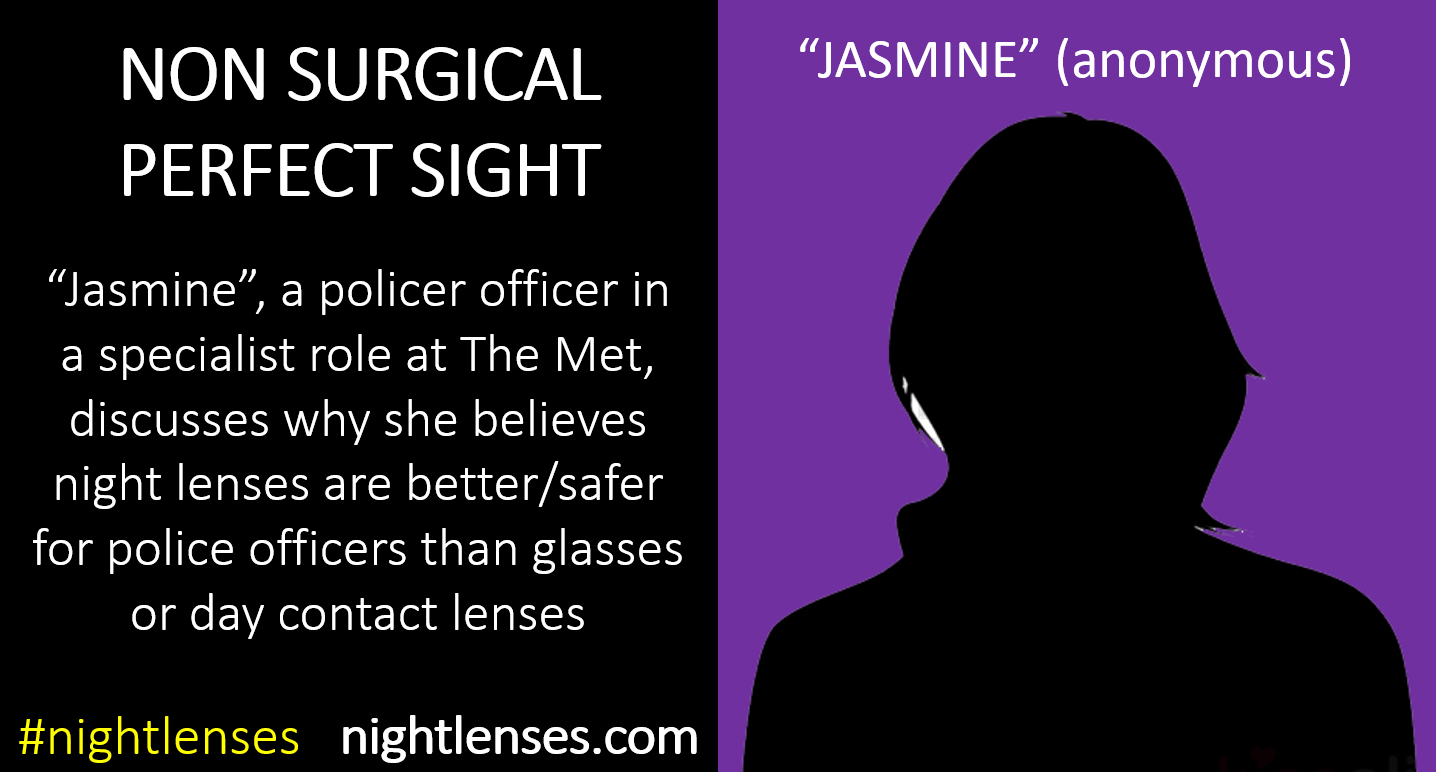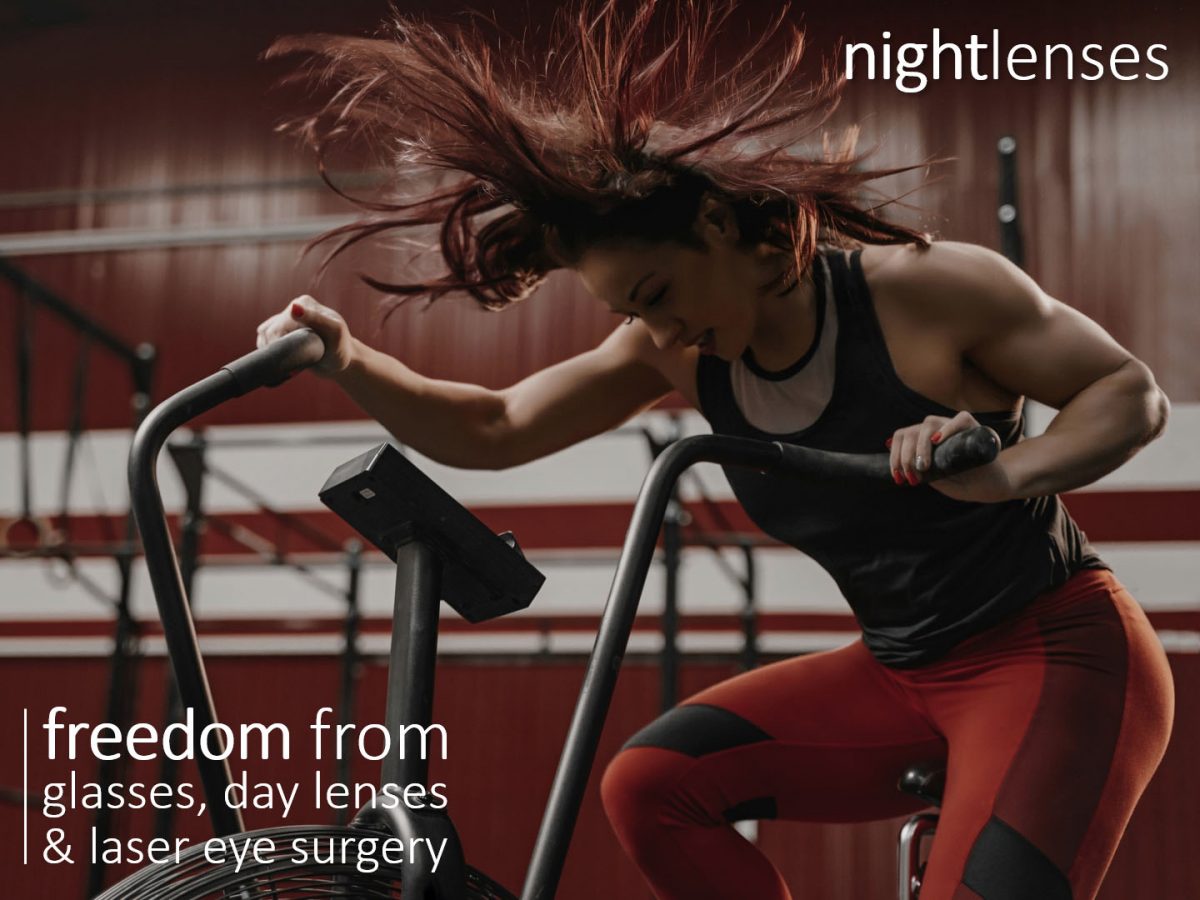Part 1: We had a chat with officer “John” (keeping it hush-hush), a 47-year-old who spent 13 years on the front line with TSG in Northern Ireland. John recently got hooked up with night lenses, and let me tell you, they’ve turned his world around. He wishes he got them sooner, for both his job and home life. His take is that doing police work feels smoother and safer with night lenses compared to the daytime ones. Check out the interview transcript for the full scoop – you can catch the video HERE.
Part 2: Following up on John’s experience, we sat down for a chat with night lens enthusiast “Jasmine” (not her real name), a police officer in a specialist role with The Met. The interview transcript is below, or you can catch the video interview on YouTube HERE.

Absolutely. When I was a teenager, they dropped the glasses bomb on me, which I wasn’t thrilled about. So, at 16, I switched to contact lenses. Fast forward to 18, I joined The Met, and by 21, I opted for laser eye surgery. I enjoyed about 12 to 13 years of clear vision. As my eyesight started slipping again, I found myself at a crossroads – back to contacts or glasses? That’s when night lenses popped up. Honestly, I had no clue what night lenses were, so I was a bit hesitant. But the more I delved into it, the more I thought it could work for me. It seemed foolproof – pop in some lenses before bed, sleep, and wake up with corrected vision. It seemed too good to be true, like a typo or an error. I was pleasantly surprised that it worked; by morning, my vision was perfect. It felt like wearing glasses or contacts, but with nothing in my eyes! Not dealing with either and still having perfect vision all day? Count me in.
Your role involves shift work – did you have concerns about wearing night lenses during shifts?
No worries at all. If I’m on night duty and crashing during the day, I just throw in my night lenses. Wake up, pop them out, and boom – perfect vision throughout the night. Regardless of the shift, as long as I wear them during my sleep (a minimum of 4 hours), I’m set for a full day of crystal-clear vision. I might go a day and a half before realizing I need to put them back in. The best part is that every day, I head to work without fearing my contact lenses might bail on me. Especially during prolonged wear, like unexpected last-minute calls or extended tours of duty – you know the drill. It’s a relief not to worry about drops or dry eyes. Discovering night lenses was a game-changer.
In a previous chat with ‘John’ from TSG in Belfast, he started night lenses in his late 40s and emphasized the benefits during active operations. He found himself stuck in the middle of something, unable to get out, and his lenses would get itchy and dry. Having perfect sight and nothing in his eyes would have been a bonus. Let’s delve into your operational role. You mentioned two parts – the earlier operational days and then the specialized role. Reflecting on the operational side, where CS gas might come into play – would night lenses have made things easier compared to day lenses at the time?
Absolutely, I’d recommend night lenses to anyone considering day contact lenses. When deploying CS spray or PAVA nowadays, you don’t have to fret about the aftermath. While some may be fine, it affected me as much as the person I was dealing with. Knowing there’s nothing in your eyes that can add to the irritation is reassuring. Given the choice, I’d opt for night lenses over day contacts, especially since PAVA can mess with your contact lenses afterward.

Absolutely, I’m into high-impact stuff like HIIT and circuit training. The beauty of night lenses for me is knowing I can do all that without stressing about losing my contacts, having them fall on the floor during a workout. It’s perfect for high-impact activities. Another perk is when I hit the pool with my little one. I can dive underwater without worrying about not seeing or losing a lens. I don’t fret about checking the clock or anything. Everything is crystal clear, just as I’d expect with glasses or contacts, but without actually having anything in my eyes. I don’t have to deal with them steaming up while running or any unexpected mishaps. I’ve had night lenses for about seven years now – I wouldn’t go back to day lenses. If I knew about them before my laser eye surgery, I might have started with night lenses. Many people assume laser lasts 20 to 30 years, and you don’t need to think about it until your 40s or 50s. Realizing I’m exploring alternatives less than 15 years later, I wish I went with night lenses first.
It’s refreshing to hear from someone who’s been through both laser and night lenses. A lot of folks assume laser surgery is a one-time permanent fix, but that’s not the case! There are risks, from floaters to other stress-inducing issues, and that scares people off. Your experience with both laser and night lenses is quite interesting. So, for those mulling over laser, you’re suggesting night lenses as a way to ease into a life free from glasses and contacts – and laser could be an option down the road?
Exactly! Laser is always an option later on. What I appreciate is that my prescription hasn’t changed over the years; I’ve been consistent for the last seven. Night lenses have kept my eyes steady, whereas with LASIK, I was gradually deteriorating. So, for those hesitant about surgeries or seeing laser as a big commitment, try night lenses as a viable alternative. Knowing what I know now, I would have chosen night lenses sooner.
Before this interview, we discussed the term ‘myopia,’ and I found it amusing to break the news to you that you have myopia! [Jasmine laughs] For those unfamiliar, myopia is commonly known as ‘short-sightedness’ and is linked to eye diseases, detached retinas, etc. First off, do you think colleagues with short-sightedness should learn the term and understand it? Secondly, as a parent, if you have myopia or your parents do, chances are your child might too. Is this something you should consider and learn about for your child as well?
Absolutely! Honestly, at the big-name places on the high street, it’s just ‘short-sight’ and ‘long-sight.’ No one talks about myopia. I didn’t know about it, but I do now. Short-sight is downplayed like it’s not a big deal and can be fixed with contacts or glasses. Realizing it worsens over time and can lead to eye diseases, I now see I was a bit naive or didn’t give it much thought. Being more aware now, I’m more cautious. It’s better to stay on top of it rather than be too relaxed. There could be an underlying health issue that needs attention. With night lenses, I’ve been going to my independent optometrist yearly, who provides extra check-ups to track any changes or issues in the back of my eyes. You might not get the same thorough check-ups at the big high street chains – I know I didn’t. It’s nice to make the comparison and say, “Hey, this has been consistent for me,” or, “Hmm, there’s something here that needs further medical attention.”
On that note, let’s give a shout-out to Jaimin Patel, your optometrist at Vision Eyecare. I know he’s a fantastic independent optometrist who really invests the time. Jasmine, we’re similar ages, and we need straightforward info to understand our options and what’s happening to our eyes as we age. That’s why I’d encourage all short-sighted people to ask for a MyopiaChat next time they visit their optician.
Last two-parter – first, would you recommend night lenses? [Pretty sure we know the answer!]. Secondly, just like I asked ‘John’ from TSG, is it safer for police officers who can be fitted with night lenses (less than -6D) to use night lenses rather than day lenses, considering their role?
Absolutely, I’d say it’s safer for officers to have night lenses. Let me give you reasons and examples based on my 13 years of operational and frontline policing. In confrontational situations, you’re in the midst of a scuffle, not thinking, “What if I get punched and my contact lens flies out?” When using PAVA or another option, knowing how you’ll react and how badly it’ll affect you – it’s a game-changer. During extended tour duties, with daily lenses – though they’ve come a long way – after 18-20 hours, you start feeling the effects. Your eyes get dry, and you’re thinking, “I need drops.” But I don’t have to worry about that. It’s nice not stressing about dry eyes, itchiness, or constant blinking to keep my eyes lubricated. For these reasons, I’d definitely say give night lenses a try. Jaimin, my optometrist, was fantastic. It took time to get it right for me since they’re individual to each person [Note: all night lenses are custom-made to your eyes, not mass-produced]. Once he got it right, I’m glad I did it – years of perfect vision, going about my business without worrying about glasses. I can do anything without worrying about taking off my glasses at the sauna/steam room – because I can see – or an infected contact lens. It doesn’t impact my personal, social, or work life. It’s a good balance for me.
Absolutely! I shared with you earlier that the reason I’m here, doing this, is that my teenage son’s life was completely changed by night lenses. That’s why I spend my time doing these interviews and spreading the word. He’s 17 now, a surfer! If we hadn’t stabilized his myopia with night lenses, he might have gone up to -6 or -7 and progressed from there. Without glasses or contacts, he wouldn’t be able to see the waves. But now he surfs, has confidence – so I agree that night lenses are truly incredible!
Thank you so much for your time and sharing your story; we really appreciate it.
Further info
